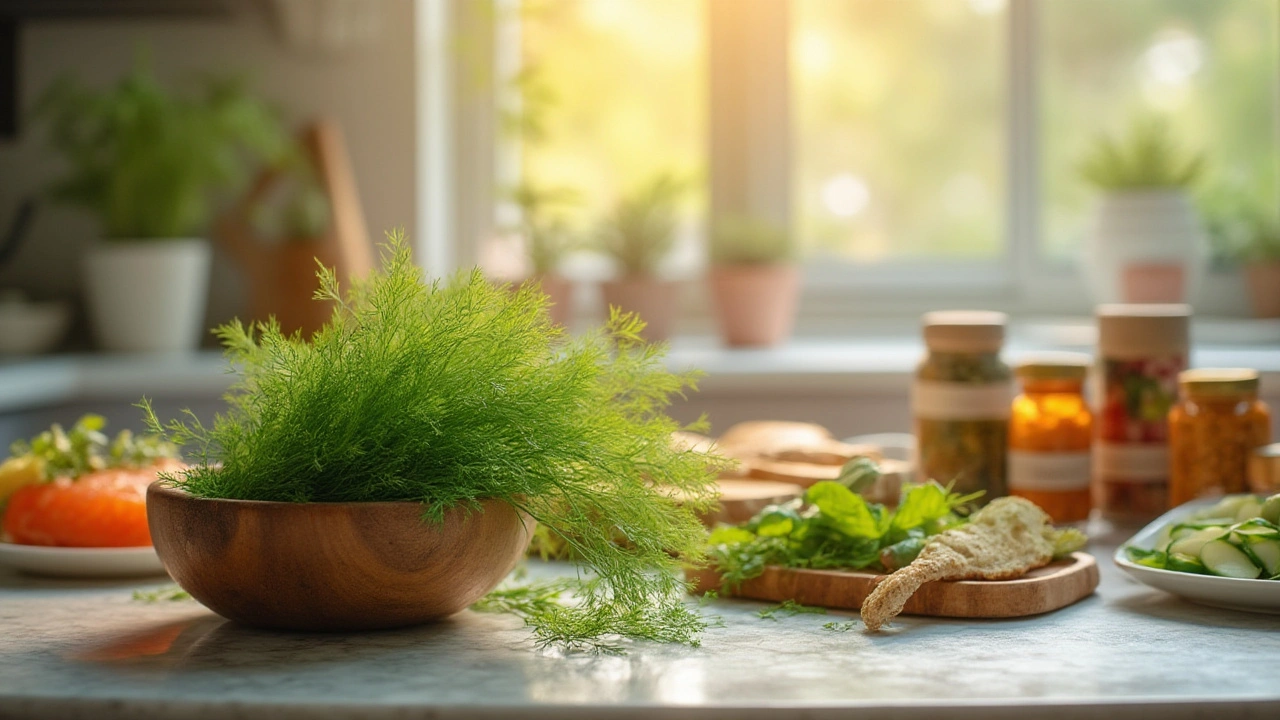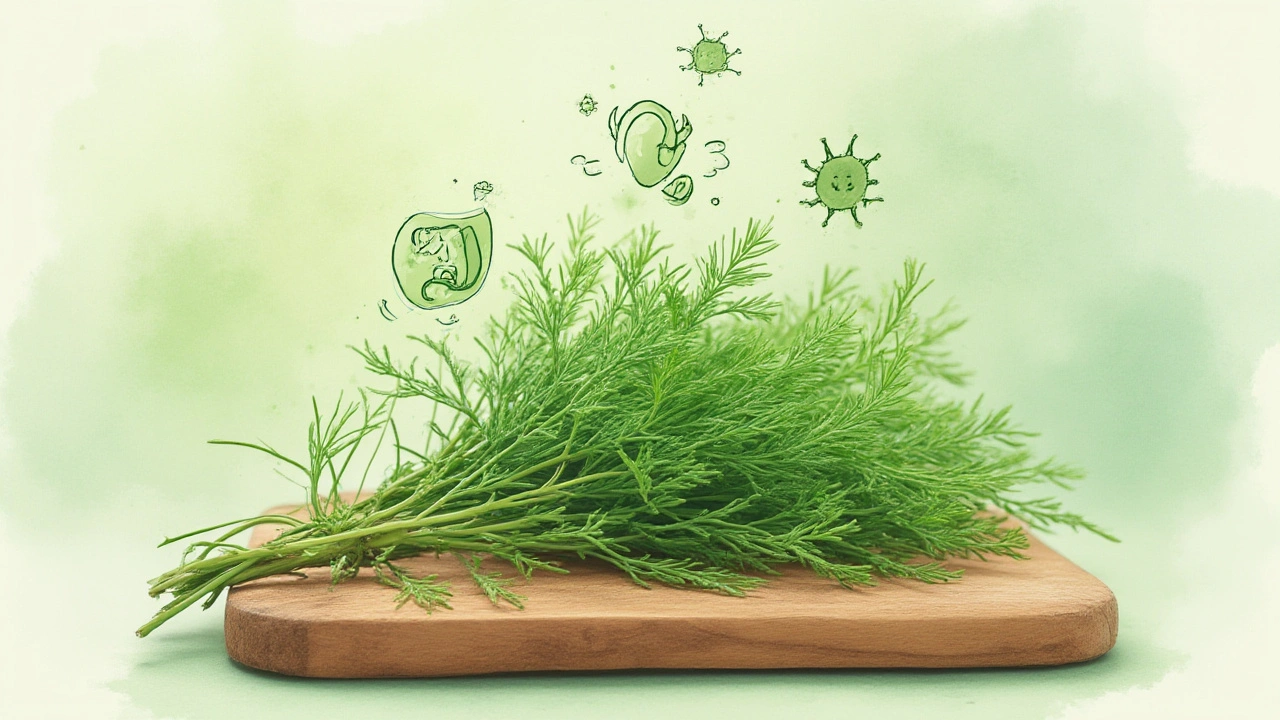Dill Supplement Benefits: Natural Health Booster and Simple Wellness Secret
 Jul, 19 2025
Jul, 19 2025
Picture this: you’re searching for something that’s simple, slips into your diet without fuss, and actually makes you feel better—inside and out. Dill isn’t just that feathery green stuff sprinkled over potato salad. This aromatic herb, with its bright green leaves and distinctive flavor, packs a nutritional punch that goes way beyond garnishing dishes. Ancient Egyptians used dill for medicinal and culinary purposes, and Hippocrates (yes, the Greek “father of medicine”) wrote about it as a valuable healing plant. Today, people rediscover it as a powerful, all-natural dietary supplement. Interested in how something so unassuming could be a game-changer for your daily wellness?
Why Dill? Ancient Roots and Fresh Science
So, why are so many people turning to dill as more than a kitchen staple? Dill isn’t a new fad cooked up by wellness influencers. It’s been around for over 5,000 years—yeah, it seriously predates most of the foods in your pantry. Ancient Romans believed dill brought luck and stamina to gladiators, while Indian ayurvedic healers swore by its soothing effects.
Fast forward to today: dill is still impressing people, just for more scientific reasons. The leaves and seeds are loaded with nutrients—vitamin C, vitamin A, calcium, magnesium, and iron. But here’s a secret: dill contains special compounds called flavonoids and essential oils (like carvone and limonene) that have antioxidant and anti-inflammatory effects. Recent studies out of university labs in Europe and Asia found that these compounds can actually help your body fight free radicals (those sneaky troublemakers behind cell aging and chronic disease).
Another fun fact: dill is a natural source of quercetin. If you’ve read anything about plant-based diets, you’ve probably heard this word thrown around. Quercetin isn’t just a trendy buzzword—it supports the immune system, fends off certain allergies, and may even play a role in cardiovascular health. In fact, a well-cited 2022 study out of Iran found that supplementing with dill extract improved cholesterol numbers and even helped regulate blood sugar for people with mild diabetes. Check out the numbers below:
| Dill Supplement Study (2022) | Results |
|---|---|
| Cholesterol reduction (average) | 15% |
| Blood sugar improvement (HbA1c) | 0.4% lower |
| Trial duration | 8 weeks |
This isn’t medical magic—just real ingredients doing real things for your body. But that brings up the next big question: what makes dill stand out among other herbal supplements? For one thing, dill doesn’t take forever to show its impact. People talk about better digestion and fresher breath days after adding dill into their routine. And while many supplements can have weird side effects, dill is gentle on most stomachs (a godsend for those of us with sensitive digestion).
Last bit for this section: dill supplements come in lots of forms. Capsules, tinctures, even powders you can stir into a smoothie. If you’re a fan of herbal teas, dill tea is another easy win—just steep the leaves or seeds and sip your way to wellness.

Everyday Benefits: How Dill Supports Mind and Body
You might wonder, does dill really have that many practical benefits? Let’s break it down. One standout effect: dill is famous for helping digestion. If you’ve ever dealt with bloating or an upset stomach after eating, here’s a cool tip—chewing on a few dill seeds or drinking a cup of dill tea can calm things down, fast. That’s not just an old wives’ tale—there’s science behind it. Dill’s essential oils help relax gastrointestinal muscles and even fight bacteria that can make your tummy feel off.
If you’re trying to keep your heart happy, dill’s a real friend. Some of the compounds lower LDL (“bad”) cholesterol and bring up HDL (“good”) cholesterol. This isn’t some hype from supplement companies—a study from Poland in 2021 tracked patients with mild hyperlipidemia and found an average drop of 10% in LDL cholesterol after 12 weeks of dill extract supplementation.
Worried about bone health as you age? Dill has calcium and magnesium, two minerals your body craves for strong bones and steady nerves. Incorporating dill into your daily supplements can be a clever way to sneak some extra bone support into your routine, especially if dairy isn’t your thing.
On the mental wellness side, dill is more subtle but still impressive. Dilapiole, one of the essential oils in dill, has mild relaxing properties. Some herbalists use dill to help ease minor anxiety and promote better sleep, especially when dill is combined with chamomile or lemon balm in an evening tea. People tell stories about feeling less restless and falling asleep faster—if nightly tossing and turning is your nemesis, dill could be a new toolkit piece.
For those with seasonal sniffles or mild allergies, dill’s antihistamine effect is worth a look. Researchers in Sweden recently looked at the anti-allergy action of dill extract and found it blocks histamines in a way that’s similar (though gentler) compared to some over-the-counter meds. No grogginess, no weird dryness—just natural relief from plant power.
A surprising area where dill shines? Fresh breath. Chewing dill seeds after a meal isn’t just about flavor—it actually helps fight odor-causing bacteria. Think of it as nature’s breath mint (without the sugar or artificial stuff). Some wellness experts suggest stashing a small packet of dill seeds in your bag—way chicer than gum, and better for your stomach too.
Another tip: dill may help with menstrual discomfort. There’s a small but growing body of research from India and Iran showing that dill extract can help ease cramps and general discomfort. The findings suggest dill is particularly effective when taken during the first couple of days of a period, so keep that in mind next time cramps hit.

Simple Ways to Add Dill to Your Daily Routine
Ready to actually use dill on a regular basis? You don’t have to be a chef—or own a bunch of supplement bottles—to get started. Here are a few of the simplest, least-intimidating ways to enjoy dill’s benefits without a big change to your habits.
- Dill capsules or pills: This is the fastest way for most people. Just read the label for dosage (usually 300–500mg per day is standard) and check for good quality. Pick brands using pure dill extract, with little or no additives.
- Dill tea: Add 1–2 teaspoons of dried dill seeds or leaves to hot water, cover, and let steep for 10 minutes. Sip after meals or before bed for gentle digestive support and relaxation.
- Dill sprinkle blends: Some companies sell organic dill powders meant for sprinkling over salads, soups, or even popcorn. If you’re not a fan of pills, this is a fun (and tasty) way to get your daily dose.
- Fresh dill infusion: Chop a bunch of fresh dill and add to a water bottle or a pitcher for a refreshing, subtly flavored drink. It’s great for summer or post-workout hydration.
- DIY breath freshener: Keep roasted dill seeds in a small jar and chew on a pinch after meals or coffee.
Don’t forget: if you’re pregnant, breastfeeding, have allergies to herbs, or take prescription medications, talk to your doctor before starting any new supplement. That’s not just a cover-your-bases suggestion—dill can boost estrogen effects in the body, which could interact with hormone-sensitive conditions. Most people handle dill well, but it pays to check.
If you want the freshest quality, growing dill at home is shockingly easy. Stick seeds in a windowsill pot, water them a little, and watch the feathery greens pop up in weeks. Snip as needed—nothing beats snipping a fresh sprig for your tea or dinner.
Last word? Don’t think of dill as just a garnish or a relic from your grandma’s spice rack. This little green wonder works as a powerful, affordable, and natural dietary supplement. Maybe it’s time we all started treating it as the healer it’s always meant to be. Next time you’re at the store or digging in your herb garden, think about all the ways you can unlock the wonders of dill—and enjoy a healthier, happier you with almost zero effort.
linda wood
July 22, 2025 AT 21:03LINDA PUSPITASARI
July 23, 2025 AT 06:25gerardo beaudoin
July 24, 2025 AT 00:08Joy Aniekwe
July 25, 2025 AT 08:33Sullivan Lauer
July 25, 2025 AT 22:17Sohini Majumder
July 26, 2025 AT 12:14tushar makwana
July 27, 2025 AT 15:05Richard Thomas
July 29, 2025 AT 12:10Matthew Higgins
July 30, 2025 AT 22:01linda wood
August 1, 2025 AT 18:22